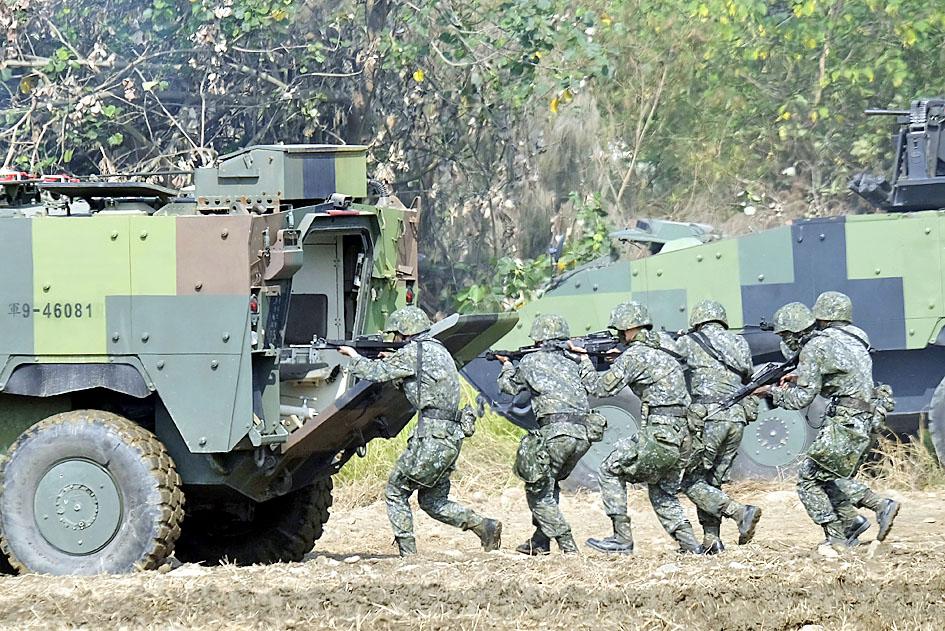US special operations forces have been quietly training Taiwanese soldiers for months, risking the ire of China, a US Department of Defense official said on Thursday.
A contingent of about 20 special operations and conventional forces has been conducting the training for less than a year, said the official, who declined to be identified, adding that some of the instructors rotate in and out.
The official largely confirmed a Wall Street Journal report that said a US special operations unit and a contingent of US Marines have been secretly training military forces in Taiwan to help shore up the nation’s defenses, as concerns mount over potential Chinese aggression.

Photo: AFP
In Taipei, the Ministry of National Defense yesterday declined to comment on the Wall Street Journal report, and the American Institute in Taiwan, the US’ de facto embassy in the nation, only referred to the US Department of Defense without commenting further.
Premier Su Tseng-chang (蘇貞昌) said “a just cause always attracts much support.”
“We are making every effort to defend our national sovereignty and our people, as well as maintaining regional peace. We are doing all we can and we appreciate like-minded countries working together,” he said.
Pentagon spokesman John Supple said that generally speaking, US support for Taiwan’s military is gauged on its defense needs.
Supple declined to comment on the specifics of the report, but said that the US’ support for Taiwan remains “strong, principled and bipartisan,” in line with the US’ “one China” policy and longstanding commitments, as stated in the Taiwan Relations Act, the Three Joint Communiques and the “six assurances.”
“Our support for and defense relationship with Taiwan remains aligned against the current threat posed by the People’s Republic of China,” Supple said in a statement.
“We urge Beijing to honor its commitment to the peaceful resolution of cross-Strait differences,” he added.
The US would continue to support a peaceful resolution of cross-strait issues, consistent with the wishes and best interests of the people on both sides, he said.
In November last year, local media reported that US troops had arrived in the nation to train Taiwanese marines and special forces in small-boat and amphibious operations.
Those reports were subsequently denied by US and Taiwanese officials, who said that the two sides are only involved in bilateral military exchanges and cooperation.
The US supplies weapons to Taiwan, including missiles for defense and fighter jets, amid Beijing’s threat to forcibly annex the nation.
The US also maintains an ambiguous commitment to defend Taiwan.
Additional reporting by CNA and Lin Chia-nan

The Central Election Commission has amended election and recall regulations to require elected office candidates to provide proof that they have no Chinese citizenship, a Cabinet report said. The commission on Oct. 29 last year revised the Measures for the Permission of Family-based Residence, Long-term Residence and Settlement of People from the Mainland Area in the Taiwan Area (大陸地區人民在台灣地區依親居留長期居留或定居許可辦法), the Executive Yuan said in a report it submitted to the legislature for review. The revision requires Chinese citizens applying for permanent residency to submit notarial documents showing that they have lost their Chinese household record and have renounced — or have never

A magnitude 5.6 earthquake struck off the coast of Yilan County at 12:37pm today, with clear shaking felt across much of northern Taiwan. There were no immediate reports of damage. The epicenter of the quake was 16.9km east-southeast of Yilan County Hall offshore at a depth of 66.8km, Central Weather Administration (CWA) data showed. The maximum intensity registered at a 4 in Yilan County’s Nanao Township (南澳) on Taiwan’s seven-tier scale. Other parts of Yilan, as well as certain areas of Hualien County, Taipei, New Taipei City, Taoyuan, Hsinchu County, Taichung and Miaoli County, recorded intensities of 3. Residents of Yilan County and Taipei received

Taiwan has secured another breakthrough in fruit exports, with jujubes, dragon fruit and lychees approved for shipment to the EU, the Ministry of Agriculture said yesterday. The Animal and Plant Health Inspection Agency on Thursday received formal notification of the approval from the EU, the ministry said, adding that the decision was expected to expand Taiwanese fruit producers’ access to high-end European markets. Taiwan exported 126 tonnes of lychees last year, valued at US$1.48 million, with Japan accounting for 102 tonnes. Other export destinations included New Zealand, Hong Kong, the US and Australia, ministry data showed. Jujube exports totaled 103 tonnes, valued at

BIG SPENDERS: Foreign investors bought the most Taiwan equities since 2005, signaling confidence that an AI boom would continue to benefit chipmakers Taiwan Semiconductor Manufacturing Co’s (TSMC, 台積電) market capitalization swelled to US$2 trillion for the first time following a 4.25 percent rally in its American depositary receipts (ADR) overnight, putting the world’s biggest contract chipmaker sixth on the list of the world’s biggest companies by market capitalization, just behind Amazon.com Inc. The site CompaniesMarketcap.com ranked TSMC ahead of Saudi Aramco and Meta Platforms Inc. The Taiwanese company’s ADRs on Tuesday surged to US$385.75 on the New York Stock Exchange, as strong demand for artificial intelligence (AI) applications led to chip supply constraints and boost revenue growth to record-breaking levels. Each TSMC ADR represents